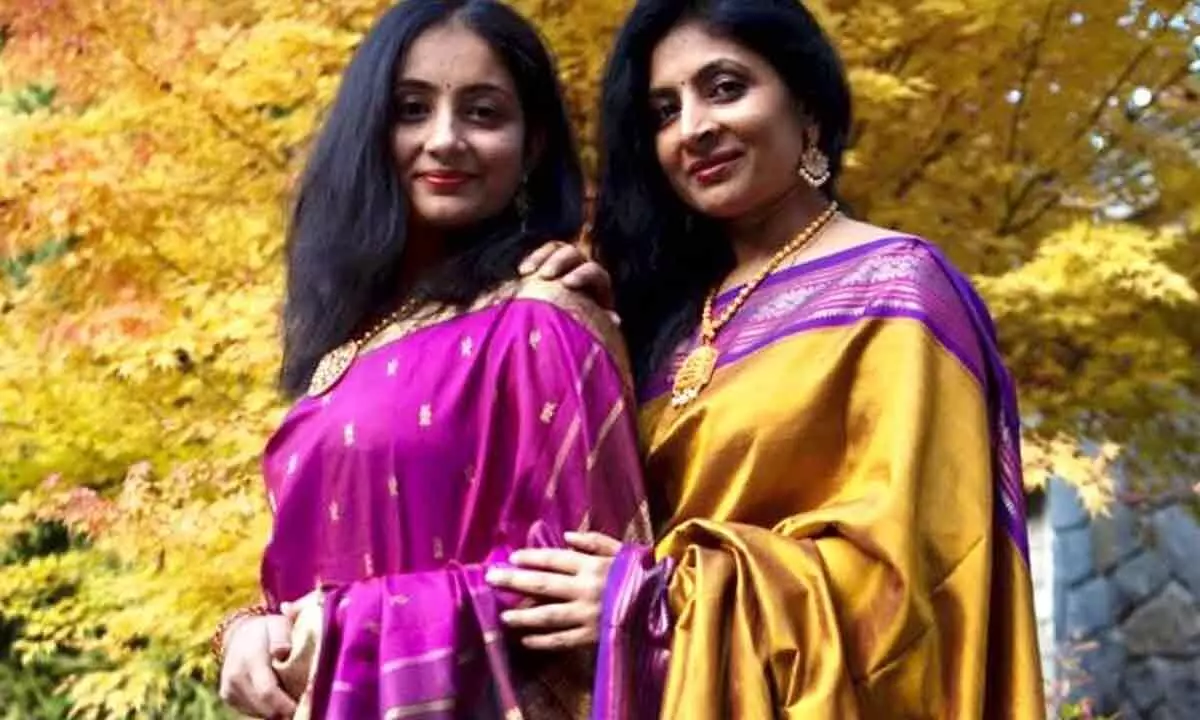Women entrepreneurs keeping our culture alive

“Fir v Dil hai Hindustani” a common dialoge which we often hear in the contemporary movies but do we ever try to go deep a little and excavate the significance of these words.
"Fir v Dil hai Hindustani" a common dialoge which we often hear in the contemporary movies but do we ever try to go deep a little and excavate the significance of these words. There's a peculiar thing about us Indians, wherever we are no matter which country we are in but we have a not so easily satisfied craving for everything that our country indigenously owns, may it be products or services. In fact this clearly shows how much deep rooted we are in our country pride. Beyond the movies, this dialogue has been stamped once again by two sisters, Aparna Thyagrajan and Ambika Thyagrajan.
We are what we nurture in us. Exactly what happened with Aparna Thyagrajan who started way too early in her life to learn to respect and love the affluence our country has in the form of weaving craftsmanship. She was acquainted too early with the weaving skill and embraced it with open heart by imbibing it deeply in herself. She sewed a dress out of an old saree when she was 12 years old for her sister Ambika for her 2nd birthday.
As Aparna's age progressed, so was her love for ethnic fashion progressing. Gradually her sister Ambika also started inclination towards this. Post Aparna's marriage in 2002 and settling in Seattle, what she missed the most was shopping for Ethnic wear.
Though there were limited shops in the US but none could cater to the actual needs. In her visit to India in 2018 a Zardosi artist basically gave her love for ethnic wear a entrepreneurship dimension by suggesting her to open a boutique. This idea hit hard with her and made her think about execution.
The execution got a finalised name "Shobitam" and it rolled out from March 2019 by the sisters. Days went by and what started out by just selling 15 sarees initially has turned into a company which has more than 1,000 products in its repertoire, client base in over 30 countries and is currently having a turnover of Rs 9 crores. Plus its featured as one of the top stores on Etsy, an American E-commerce company dealing in such products.
The company has brought international fame for weaving industry as well as the artist primarily involved in this. Giving the respect and enumeration that a weaver wants out of his work. It has association with over 340 weavers and artisans across 16 cities in India. It opened up avenue for employment of weavers and nurturing their skills to a higher level by representing it on the international picture. The company is taking leverage of the Indian art and earning globally. The most beautiful aspect is even during Covid pandemic the weavers were working and were not brought at standstill. They even started an initiative named Shobitam Gig where they provided 50 % of the business proceeds was donated in the form of dry ration to around 600 weavers during the pandemic.The artisan community is getting empowered across India — from Sozni in Kashmir to Chikankari in Uttar Pradesh, Dabu in Rajasthan, Ikkat in Odisha, Moiran Phee in Manipur, Pen Kalamkari in Kerala and many more.
In an exclusive interview with The Hans India, Ambika and Aparna Thyagrajan opened up about different aspects of their business and how they had used the Indian weavers to gain leverage of their skills.
Your startup is doing great internationally especially in handmade wears but on the other side there is less demand in India for the same. What is that 'X' factor where we see great demand in ethnic as well as handmade wears in foreign and not in India?
At Shobitam, our vision is to "Democratize Ethnic Fashion Globally" and we are currently targeting the 18M NRI's living world wide. So we have seen great response from all the International customers living in USA, Canada, UK, Australia and Singapore where we have shipped to our tens of thousands of customers across 35+ countries. We do believe India is a huge untapped market with potential and we will be entering India soon.
If we talk about industry scenarios - demand for Indian ethnic wear is huge in foreign because NRI's don't get it easily. Also many foreigners love Indian wears and prefer to drape in our rich and traditional outfits. They like the detailing of the handmade art and that's what make them shop.
World is attracting towards western culture. Being founder you closely observe statistics. According to you what is the response towards Indian ethnic wear internationally?
Indian ethnic wear and especially sarees evoke deep emotional connections with our culture and home for NRI's. But when we talk about foreigners - they enjoy Indian festivals, food and like Indian ethnic culture. Even the world is shifting to western fashion - traditional essence will never change. We have seen excellent responses to products such as authentic Silk Mark Certified quality. We make sure to offer great value with fast delivery.
Due to advance technology, less manpower is offered job. As y'all support weavers community - what steps are taken in favor of them in terms of employments and financial support?
Technology is snatching employment opportunities in every industry. But no one can replace the art of handmade. Indian weaver families have learnt this art from their ancestors and following the tradition since ages. But in recent times due to advance in technology - there is a great fallback to this community and day-by-day it's diminishing. At heart, Shobitam is a technology driven company with both our co-founders having a deep tech background and our leadership has worked at companies like Microsoft, Amazon etc. However we are very strong believers also of the handwork, arts and crafts talent of our 340+ weavers who work for us across 18 cities in India and leveraging technology to support their work both in the backend and enable the best experience for our customers in the front end.
We also fully support our weavers and artisans not just with daily reliable employment but also with industry best wages and also support their families through the Shobitam GIVE program for financial support and Shobitam CARE program for their children's education. See below for the Shobitam Social Impact programs.
We believe in giving back to the community, and we believe in doing it consistently and in the best manner possible. Our initiatives to make a social impact are aimed at not just creating sustainable product ranges, but also collaborating organizations that would help our customers to make a conscious choice as well.
What is the USP in product making (from the angle of Weavers community)
Our USP is driven by 5 pillars with a goal of showcasing the great products from our Weavers and Artisans - To design and deliver their Best Selections, Quality, Value, Convenience and 5 Star Service with handmade weaves from across the length and breadth of India. Also our weavers are well experienced as they follow this practice since their ancestors. By supporting them in whichever way - we are somehow trying to keep the tradition alive in India and also proudly presenting it globally.
Any suggestions to aspiring women entrepreneurs?
Listen to your gut - Not the Naysayers! Be bold to start with your passion, build great diverse teams around you and aim high to make an impact. We will conquer the world!
From VR to Metaverse, how technology is changing the face of fashion industry?
Technology is not just changing fashion with digital solutions, but the whole gamut of how we consume everything in life. Having recently participated in the Metaverse Fashion week, the world of digital fashion is transforming right in front of our eyes with amazing opportunities and speed. The digital fashion industry could be worth $ 50 billion by 2030, according to figures from investment firm Morgan Stanley. Both the metaverse and mixed reality technologies are changing the way we understand fashion. We could move freely between different 3D worlds and communities with the help of virtual and augmented reality. Similarly, we are testing MR technology like Hololens where we are able to allow even our customers to try on ethnic fashion on a remote 3D way without touching or wearing the product creating a personalized and engaging experience that benefits both customers and our brand!














